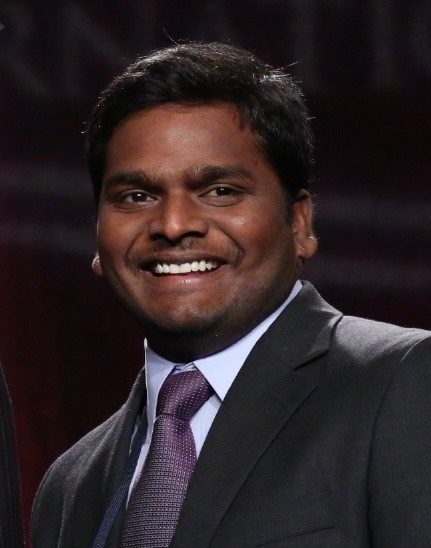Meet Dr. Kaliramesh Siliveru
Dr. Kaliramesh Siliveru, a 2025 University Outstanding Scholar Recipient
B.Tech in Food Science, Acharya N.G. Ranga Agricultural University, India ‘10
M.Tech in Food Process Engineering, NIFTEM-T, India ‘12
Ph.D. in Grain Science and Industry, Kansas State University ‘16
Share a look at your background.
In India, I completed my bachelor’s in food science and master’s in food process engineering. After my master’s, I was looking for options for doing a Ph.D., and people recommended K-State. It’s the only university in North America that offers a degree in grain science. I applied for K-State, started in 2014 and graduated in 2016. I was a research fellow at USDA before I became an assistant professor at K-State in 2018.
What are some of the classes you teach?
I teach three classes, the first of which is an undergraduate class called Materials Handling. We talk about how you handle grains and feed. All milling science, baking science and feed science students take that class. I also teach two graduate-level classes. The first is Particle Technology, where we talk about powdered materials and how to characterize them, how they flow and what we can do with the powders. The second graduate class is Advanced Grain Processing Technology, where we talk about processing tools for milling sorghum, wheat, rice and other types of grain.
What do you hope students gain from your classes or research?
I try to inculcate this habit of continuous learning. It’s not only me teaching them, but they also teach me. I have some students I’ve learned a lot from. I ask them to continue learning in these fields, because I did my Ph.D. about nine years ago, and there are new things to learn. I teach them that they’re ready when they go into the industry, and it’s not about just gaining knowledge in the classroom, but how you apply that knowledge and solve problems.
How do you work with students outside of the classroom or lab?
I take the time to learn about students’ backgrounds and understand what they’re missing. I have a lot of international students, and they often miss their families. I try to create an environment in the lab where students can share anything and everything with me. I’m there to help them.
How would you describe your teaching philosophy?
My philosophy is based on four pillars. The first is continuous learning. The classes and research projects are not just for the sake of grades, but to nurture and build on the enthusiasm they have for learning. The second is critical thinking: how are we going to solve problems? The third is team building. As one person, we cannot solve everything, so how can we build a team? How can we inculcate different ideas and bring someone on board to solve a problem? The fourth and final pillar is not seeing problems as problems, but seeing them as opportunities. Don’t run away from them, but view them as opportunities to give you a platform to bring out the solutions.
What does receiving the University Outstanding Scholar Award mean to you?
Receiving the Outstanding Scholar Award was possible because of the wonderful opportunities K-State gave me. I was a student, then I became faculty and now I am a University Outstanding Scholar, so it’s kind of a full circle. It’s because of the education I got, my mentors, teachers and students. It’s to them.